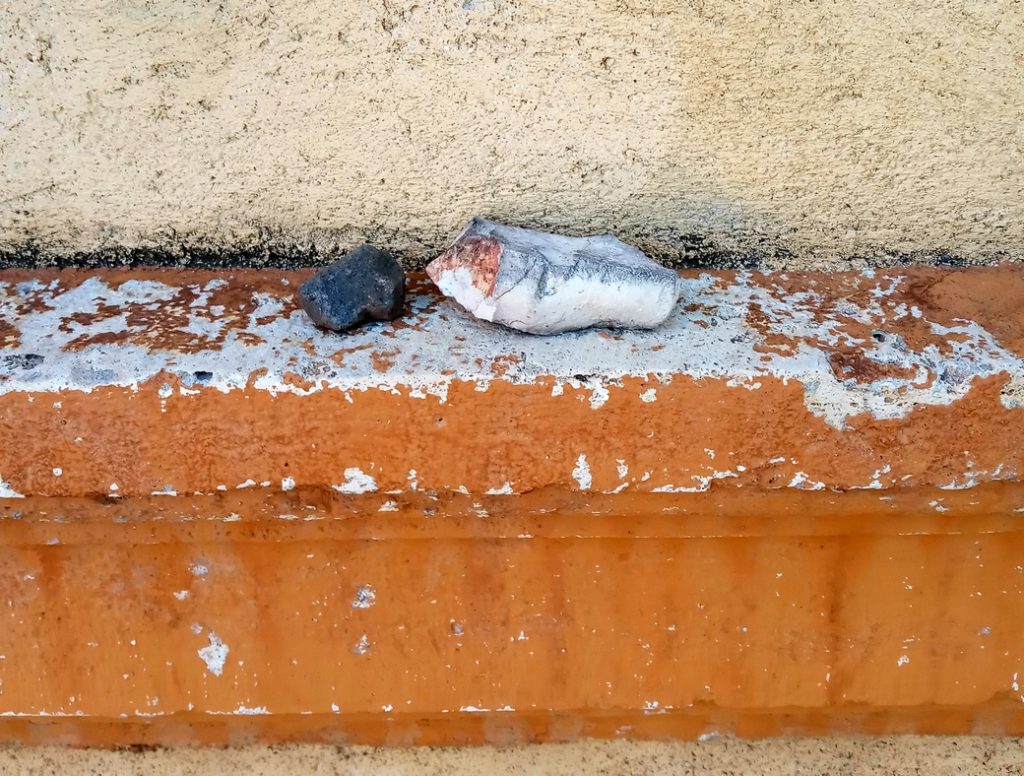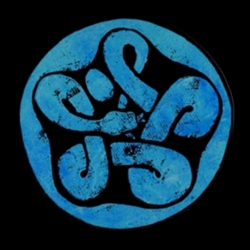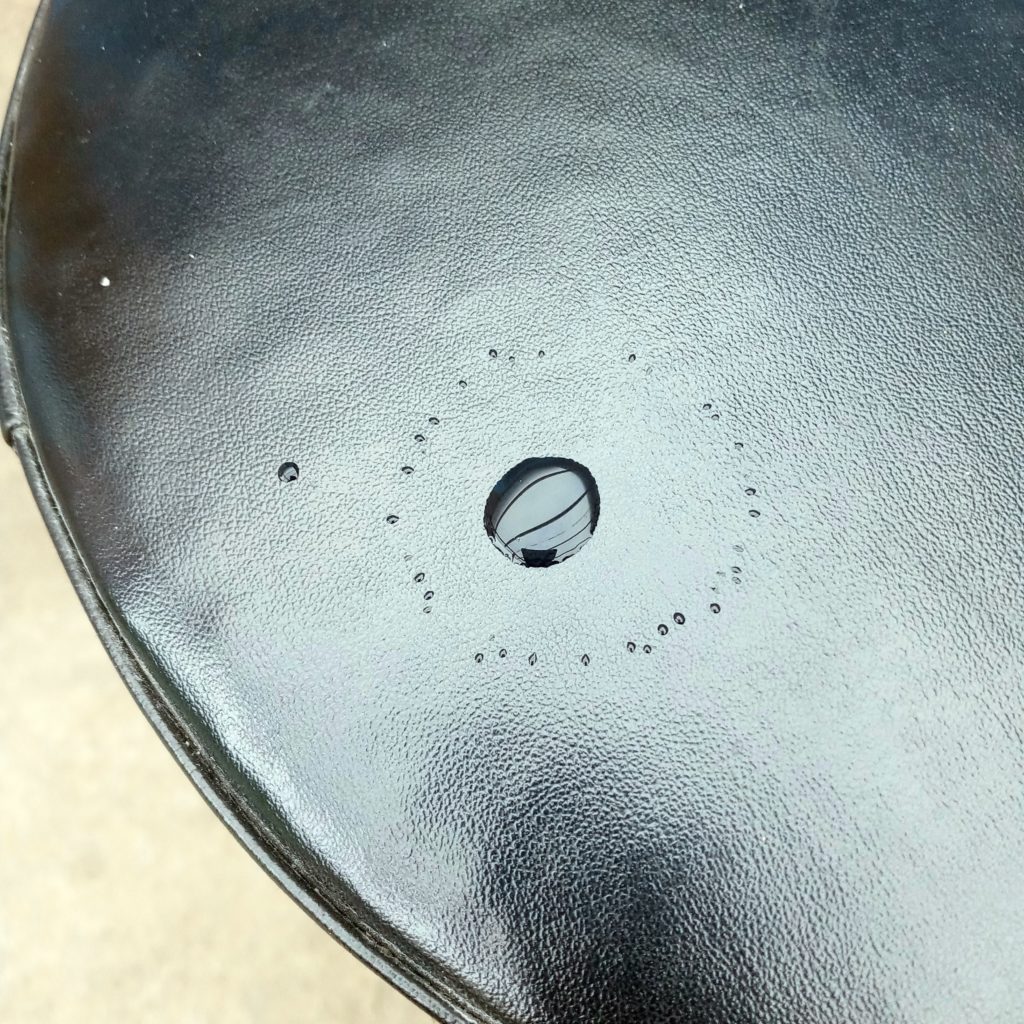Van itt, a közeli állomásépület falán, egy emléktábla.

Már talán pár éve is figyelem, hogy a kövek, amiket a tábla alatti párkányra szoktunk helyezni, újra és újra eltűnnek. Újabban pedig azt is észrevettem, hogy napközben gyakran egy furgon parkol a tábla előtt, a járdán, úgy, hogy teljesen eltakarja azt.
Nemrég egyik reggel elindultam a szokásos portyámra: a kis, kétkerekű kordé, amit húzok, valójában bicikli-utánfutó, de gyalog is remekül használható. Elsétálok a piacra, a henteshez, bemegyek a boltba is, aztán hazahúzom a zsákmányt. Szeretek a zöld utakon, a patak mellett meg a réteken menni: nálunk szerencsére az út jórésze megoldható ilyen ösvényeken. Visszafelé a nedves fűben mezitláb jöttem aznap, és amikor megérkeztem az állomáshoz, kedvem támadt utánajárni, mi történik a köveinkkel.
Azért persze tudom, hogy meghökkentő látvány lehetek sokaknak: ötvenes, köpcös fószer egy fekete műanyag taligát húz maga után benne élelemmel, és a fején fejhallgatóval, vidáman vigyorogva ballag mezitláb a harmatos, hideg fűben. Így aztán visszavettem a szandálomat, mielőtt bementem és feltettem a kérdéseimet a pénztárosnak. Azt válaszolta, ő erről semmit sem tud, így nem áll módjában segíteni. Kérdésemre, hogy akkor kitől kérdezzem meg, azt mondta, próbálkozzak a forgalmi irodán, az állomásfőnöknél.
A forgalmi irodán barátságos szőke hölgy fogadott, aki először is biztosított róla, hogy nem ő az állomásfőnök, – aki nincs is bent éppen – , de aztán azért megkérdezte, hogy milyen ügyben keresem. Elmeséltem neki a tapasztalataimat, és azt is hozzátettem, lehet, hogy a személyzet egy olyan tagja távolítja el újra és újra a köveket, aki nem tudja, hogy a zsidóknál a kövek elhelyezése régóta szokásos kegyeleti aktus.
Azt mondta, ő tisztában van ezzel a szokással, és biztos, hogy a köveket nem az állomás személyzete veszi le, inkább sajnos ezek a mai fiatalok. Megköszöntem a segítségét és hazamentem, de előtte még felraktam a párkányra két követ.

Mindez talán három hete történt. Az a két kő azóta is ott van.
És a furgon se parkol már a tábla elé.
*
On the wall of the nearby station, there is a memorial plaque. It says: “In memory of the Jewish citizens deported from Tata on June 6, 1944 – Tata Town Municipality, 2014”.
I guess it’s been a few years now: every once in a while we place stones on the ledge below the plaque, and then they disappear. More recently I’ve also noticed that during the daytime, on most days there is a van parked on the pavement in front of the plaque in such a way that it is completely occluded.
A little while ago I set off on my usual morning outing: the two-wheeled little cart that I pull along is actually a bicycle trailer, but it works just as fine on foot. I walk to the market, to the butcher’s and I go to the supermarket, too, and then I pull the victuals home. I prefer to walk along greenways, meadows and the stream: luckily, in our town much of the journey can be arranged along such paths. On the way back, I was walking barefoot in the dewy grass until I arrived at the station. It occurred to me to try and find out what happens to our stones.
Of course I know that I’m probably a startling sight for many people: a podgy fellow in his fifties pulling a black plastic cart full of food, with headphones and a jolly smile, plodding along with no shoes on in the cold, wet grass. So I put my sandals back on before I went in and put my questions to the lady in the ticket office. She told me she knew nothing about the matter and was therefore unable to help me. When I asked who could help me, she told me to try the stationmaster.
At the stationmaster’s office I was met by a friendly blonde lady who first of all assured me she was not the stationmaster, who was not around, but then asked me what I wanted. I told her about my observations and added that perhaps a station employee had been removing the stones because they didn’t know about the old Jewish custom of placing stones as tokens or remembrance.
She told me she was fully aware of the custom, and she was totally certain the stones were not being removed by station staff, more likely, unfortunately, by these young people today. I thanked her for her help, but before I did, I put two stones on the ledge again.
All of this happened about three weeks ago. Those two stones are still there.
And the van doesn’t park in front of the plaque any more, either.









